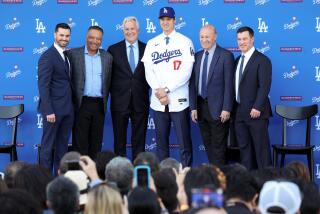Hitting high notes
Big Russ played saxophone.
Little Russ played shortstop.
Big Russ would leave their Montreal apartment at dawn and descend into the bowels of the subway, where he would pull out his sax and make his living. He was a street musician, playing “Misty” for the rush-hour commuters who would fill his case with dollars and his vision with hope.
Little Russ was one of those commuters. While Big Russ was playing in one dim corner, Little Russ was racing through another, jumping on a train for the hourlong trip to the only school where he could play baseball.
The father worked the cluttered Montreal streets. The son worked the clumpy Montreal diamonds.
The father dreamed of an easier life. The son dreamed of a better league.
Roommates and friends, the two men lived together for the most important four years of their lives, making the sort of haphazard, harmonious music that only a father and son can make.
Next week in Dodger Stadium, they hope to orchestrate the finale.
Little Russ -- Russell Martin of the Dodgers -- will be catching for his fifth week in the big leagues.
Big Russ -- his father, Russell Martin -- hopes to find the money to fly down to see him play for the first time as a professional.
Said Little Russ: “I have dreamed of that day.”
Said Big Russ: “My bag is already packed.”
Said Little Russ: “He didn’t just teach me about being a baseball player, he taught me about being a man.”
*
From Yeager to Scioscia to Piazza to Lo Duca, the legacy of Los Angeles Dodgers’ home-grown catchers has been as diverse as it is special.
Meet Russell Nathan Coltrane Jeanson Martin.
Yeah, that’s Coltrane, as in John Coltrane, the late celebrated jazz saxophonist.
“That name came from me,” Big Russ said.
Meet Russell Martin, the rookie who thinks he’s a veteran, the French Canadian skater who thinks he’s an Alabama linebacker, the coolest of all the new Dodgers kids.
“You see him walk on to a big league field and it’s like he’s been here forever,” General Manager Ned Colletti said.
And he’s likely to stick around, having already registered the sort of impact not usually felt on that first landing from Las Vegas.
In his 24 starts as Dodgers catcher, Martin has led the team to a 20-4 record.
Of 10 attempted steals, he has thwarted five.
In 82 at-bats, he has a .358 on-base percentage.
“You could tell right away, he’s a special one,” Dodger Manager Grady Little said.
And that’s only on the field.
Off the field, Martin is as unconventional as, well, any major league catcher who has been a catcher for only four years.
He is as unconventional as one who spent part of his childhood in Paris, and part of his childhood taking batting practice at an ice rink, and all of his childhood under the watchful eye of an eclectic street musician who would roller-skate miles to his games because he didn’t own a car.
Said Big Russ: “My son has taken an interesting path, eh?”
Said Little Russ: “I guess I’ve been around.”
Martin has lived all over Canada, spent two junior college years in the Florida Panhandle, and was a 17th-round pick who signed for $40,000 during a dinner at Ruby Tuesday.
Most of the money went to purchasing his first car. The rest of it went to pay bills.
He’s living in a room at Brad Penny’s house, driving a rental car, and saving to fly Big Russ to Los Angeles.
“I’m not that flashy, I don’t want to take any credit,” said the soft-spoken Martin, 23. “I just like to play.”
It is this maturity that showed itself on the mound recently when he walked out to talk to an agitated Derek Lowe.
“I’m not leaving this mound until you calm down,” he told Lowe.
Lowe also marveled at how Martin continually flashed signs for the same pitch, even as Lowe was continually shaking him off.
“He was like, ‘I’m not letting you throw anything except this pitch,’ ” said Lowe. “That took a lot of nerve.”
Just wait until he gets on the mound with Eric Gagne.
Yes, it will be the first-ever battery of French Canadians.
And yes, the two players will talk to each other as they do in the clubhouse -- only in French.
“Lance le changement de vitesse,” Martin will say to Gagne.
And you can bet that next pitch will be a change-up.
*
Convincing Lowe to focus on one pitch is easy when your entire life has been a blur.
Martin’s parents separated when he was 2, so he split time between them. Paris in the school year. Montreal sandlots in the summer. Ottawa in the winter. Montreal fungos in the summer. Speaking French to his mother, Susanne. Speaking English to Big Russ.
“I’ve been so many places, I think I learned to adjust to just about anything,” Martin said.
Just before beginning high school, he moved in with his father in suburban Montreal so he could play in the baseball program at Polyvalente Edouard-Montpetit High, the alma mater of Gagne.
“It was an important time for both of them, it taught Little Russ a lot about life,” said Susanne, a government analyst.
Big Russ played the saxophone twice a day in the subways so he could attend Little Russ’ games. He politely refused to say how much money he made during that time, but it was enough to keep them in rice and chicken and the occasional Montreal Expos game.
“We didn’t have much, but how much do you need?” Martin said. “I was playing baseball, my dad was always there, what more is there?”
Occasionally Little Russ and his friends would pass Big Russ as he blared away in the subway.
“My friends didn’t know it was him,” Martin said. “I wasn’t embarrassed, I was proud of him. He was doing whatever it took to be with me.”
This included roller-skating or riding a bike miles across town to his games, because Big Russ hasn’t owned a car in two decades.
By the time his son was a senior, Martin was good enough to play for the Canadian junior national team, but not good enough to be heavily recruited.
Once again, Big Russ literally intervened.
During the junior world championships, Big Russ was handed the phone by a Canadian coach. On the line was Shawn Larkin, assistant baseball coach at Chipola Junior College in Marianna, Fla.
Larkin was looking for the cellphone number of two other Canadian kids.
Instead, Big Russ began to sell Larkin on his son.
“We had never heard of Russell Martin, but his dad was a good salesman, so I’m like, what the heck, bring him on,” Larkin said.
Two years later, the Dodgers saw enough to draft him as a third baseman, but then he didn’t show the power required of a third baseman.
In the fall of 2002, in the Instructional League, catching instructor John Debus had an idea.
“I loved his hands, I loved his build, and I loved his aptitude,” Debus recalled. “I thought, hey, this one’s mine.”
Debus recommended that Martin become a catcher. Terry Collins, the Dodgers’ farm director, concurred.
The next spring, working in Vero Beach with former catcher Dann Bilardello, Martin became sold.
Bilardello became his advocate in organizational meetings at night and pushed him during the day, and eventually became his first catching manager early in the Class-A season at Columbus, Ga.
Said Bilardello, now the St. Louis Cardinals’ catching guru: “I’ve rarely put my name behind anybody, but, from the first day, you could just tell, this kid was going to be awesome.”
Said Martin, who also worked with minor league coach Steve Yeager: “I was told I could reach the major leagues faster from behind the plate. Hearing two former catchers say that, it was good enough for me.”
Less than four years later, in early May of this season, Dioner Navarro was injured, and Martin was pushed to the top, and now he might never leave.
But first, there’s the matter of getting Big Russ to join him.
When Big Russ received the call that his son was in the majors, he was standing by the St. Lawrence River practicing on his second instrument, the flute.
“I can’t talk to you anymore,” he told his ex-wife. “I have to go talk to the river.”
And so he stared at the power lines that run above the river, and meditated on their energy, and imagined that energy being transferred all the way to Los Angeles.
If he flies here soon, the only thing missing will be his saxophone. It is broken, and his right hand is recovering from surgery.
But one day, just as his son made the unlikely trip from the cold north to Chavez Ravine, the father hopes to travel from the subway to home plate.
Said Little Russ: “It would be so cool to have my father play the national anthem.”
Said Big Russ: “I was just thinking about that, wondering whether I could give the song enough emotion.”
He paused.
“Come to think of it, that shouldn’t be a problem.”
More to Read
Are you a true-blue fan?
Get our Dodgers Dugout newsletter for insights, news and much more.
You may occasionally receive promotional content from the Los Angeles Times.






